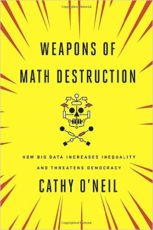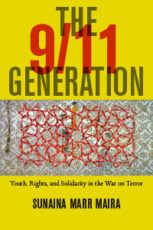with Cathy O’Niel, author of Weapons of Math Destruction: How Big Data Increases Inequality and Threatens Democracy.
About the book:
 We live in the age of the algorithm. Increasingly, the decisions that affect our lives—where we go to school, whether we get a car loan, how much we pay for health insurance—are being made not by humans, but by mathematical models. In theory, this should lead to greater fairness: Everyone is judged according to the same rules, and bias is eliminated.
We live in the age of the algorithm. Increasingly, the decisions that affect our lives—where we go to school, whether we get a car loan, how much we pay for health insurance—are being made not by humans, but by mathematical models. In theory, this should lead to greater fairness: Everyone is judged according to the same rules, and bias is eliminated.
But as Cathy O’Neil reveals in this urgent and necessary book, the opposite is true. The models being used today are opaque, unregulated, and uncontestable, even when they’re wrong. Most troubling, they reinforce discrimination: If a poor student can’t get a loan because a lending model deems him too risky (by virtue of his zip code), he’s then cut off from the kind of education that could pull him out of poverty, and a vicious spiral ensues. Models are propping up the lucky and punishing the downtrodden, creating a “toxic cocktail for democracy.” Welcome to the dark side of Big Data.
and Sunaina Marr Maira, the author of The 9/11 Generation: Youth Rights and Solidarity in the War on Terror.
About the book:
 In The 9/11 Generation, Sunaina Marr Maira uses extensive ethnography to understand the meaning of political subjecthood and mobilization for Arab, South Asian, and Afghan American youth. Maira explores how young people from communities targeted in the War on Terror engage with the “political,” forging coalitions based on new racial and ethnic categories, even while they are under constant scrutiny and surveillance, and organizing around notions of civil rights and human rights.
In The 9/11 Generation, Sunaina Marr Maira uses extensive ethnography to understand the meaning of political subjecthood and mobilization for Arab, South Asian, and Afghan American youth. Maira explores how young people from communities targeted in the War on Terror engage with the “political,” forging coalitions based on new racial and ethnic categories, even while they are under constant scrutiny and surveillance, and organizing around notions of civil rights and human rights.
The 9/11 Generation explores the possibilities and pitfalls of rights-based organizing at a moment when the vocabulary of rights and democracy has been used to justify imperial interventions, such as the U.S. wars in Iraq and Afghanistan. Maira further reconsiders political solidarity in cross-racial and interfaith alliances at a time when U.S. nationalism is understood as not just multicultural but also post-racial. Throughout, she weaves stories of post-9/11 youth activism through key debates about neoliberal democracy, the “radicalization” of Muslim youth, gender, and humanitarianism.


The segment discussing Weapons of Math Destruction was very interesting. Thank you KPFA for these important topics. Salima’s lovely voice is like the warmth from the sun defrosting my cold mornings as I drive to work. Okay, poetry fail. In other words, we (I) need more Salima!